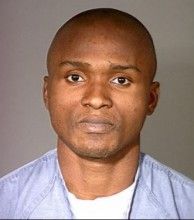Skid Row shooting appears to be complicated, unclear case
by James Poulos | March 4, 2015 10:26 am
 The police shooting[1] of a homeless Skid Row resident put the LAPD back on the defensive — a posture it has found hard to change for months on end. Struggling to maintain good civic relations after a string of scandals and incidents, the department faced renewed local protests and nationwide demands for an investigation into the killing.
The police shooting[1] of a homeless Skid Row resident put the LAPD back on the defensive — a posture it has found hard to change for months on end. Struggling to maintain good civic relations after a string of scandals and incidents, the department faced renewed local protests and nationwide demands for an investigation into the killing.
Despite the polarized political atmosphere that has surrounded the shooting, everything about the incident has seemed to complicate a clear judgment. On the one hand, the events leading up to and including the killing have been caught on videotape from multiple security sources. On the other, the video evidence failed to exonerate or condemn the officers involved.
Although five shots can be heard — suggesting potentially excessive force was used[2] on the man police seemed to overpower — one officer can also be heard warning that the suspect had gained control of his gun.
That was just the beginning of the strange twists emerging in the case. The deceased was known on the street as a former mental health patient named Africa. But Africa had a considerably more complex past.
In the late 1990s, CBS reported[3], the man successfully perpetrated an identity theft of a French citizen named Charley Saturmin Robinet, according to Axel Cruau, France’s consul general in Los Angeles. Using the name to secure a French passport, he traveled to the United States in ostensible pursuit of an acting career.
Instead of notoriety on stage or screen, however, the man eventually known as Africa ended up on the wrong end of a botched bank robbery in Thousand Oaks. Along with two others, he was arrested — a development that initially triggered a typical level of assistance from the French Consulate.
When it emerged that Africa was not in fact Robinet — or even French — he wound up in the mental health unit of a federal prison in Rochester, Minnesota. According to federal officials, CBS noted, “Medical staff determined he was suffering from ‘a mental disease or defect’ that required treatment in a psychiatric hospital.”
Remarkably, Africa’s nationality has still not been established, although on the street he was understood to call Cameroon his home country. As ABC News reported[4], court documents show he was released on May 12 of last year, having spent 14 years in prison. How he wound up on Skid Row remained unclear.
Messy fault lines
In light of the bizarre circumstances surrounding the case, the political controversy it created has taken on a complex and uncertain cast. For one thing, Africa had established a pattern of conflict with the LAPD.
As the Los Angeles Times reported[5], cops routinely struggled to make him comply with a court agreement that requires street tents to be taken down by 6 a.m. For another, two of the officers involved in Africa’s killing were equipped with bodycams — yielding footage the department claims will help exonerate them.
What’s more, Police Chief Charlie Beck underscored that the implicated cops had gone through the city’s most rigorous and carefully targeted program concerning altercations with the mentally ill and homeless.
According to the Times:
“Beck said Monday that the officers involved in the shooting were part of the Safer Cities Initiative — an LAPD task force specifically focused on skid row — and were ‘specially trained in dealing with homeless people and mental health issues.’ Some of the officers involved had undergone the department’s ‘most extensive mental illness training,’ which he described as a 36-hour course.”
As a result, Africa’s shooting fit poorly into the pattern of LAPD scandals that has attracted such negative press and public opinion in recent years. In the wake of the 1999 Rampart corruption ordeal, federal oversight of the force was imposed by “consent decree” and lifted only in 2013.
In August of last year, cops came under intense scrutiny[6] for the back-to-back deaths of Omar Abrego and Ezell Ford, an unarmed mentally ill man.
Although a groundswell of public opinion has yet to form around Africa’s case one way or the other, a small but seething crowd of protestors descended[7] on Tuesday’s weekly meeting of the Police Commission. Steve Diaz, one organizer in attendance, accused the Safer Cities Initiative of putting Skid Row under “police occupation” in order to hasten so-called gentrification around the neighborhood.
- shooting: http://www.latimes.com/local/california/la-me-lapd-shooting-20150302-story.html#page=1
- used: http://www.cnn.com/2015/03/02/us/los-angeles-police-shooting/
- reported: http://www.cbsnews.com/news/homeless-man-killed-by-lapd-on-skid-row-was-wanted-stole-identity/
- reported: http://abcnews.go.com/US/lapd-shooting-homeless-victim-released/story?id=29361808
- reported: http://www.latimes.com/local/california/la-me-lapd-shooting-20150302-story.html#page=1
- scrutiny: http://www.ibtimes.com/los-angeles-police-department-skid-row-shooting-raises-questions-about-history-1833020
- descended: http://www.latimes.com/local/lanow/la-me-ln-lapd-skid-row-shooting-20150303-story.html
Source URL: https://calwatchdog.com/2015/03/04/skid-row-shooting-appears-to-be-complicated-unclear-case/